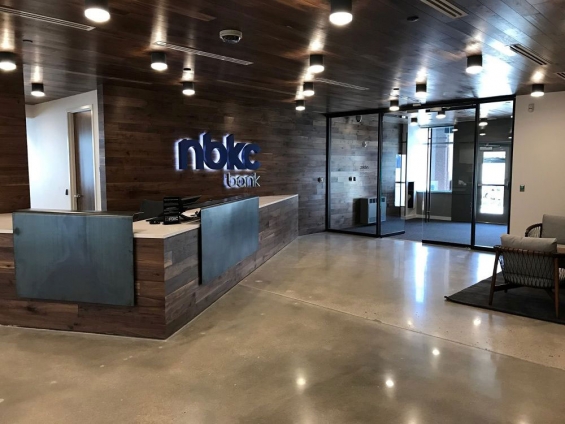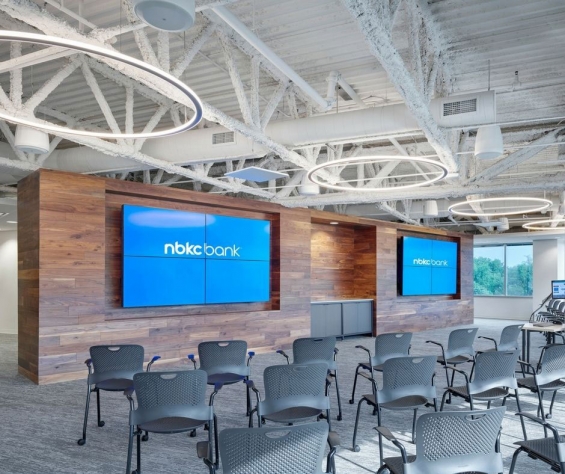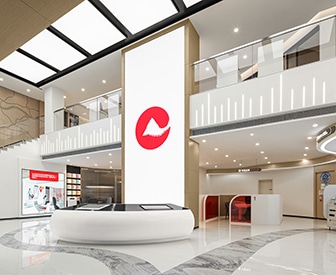You could easily place NBKC Bank alongside fintech challengers like Varo, Chime, GoBank, and SoFi among others. Just like many outside disruptors, this $650 million community bank’s business model relies on a handful of products delivered primarily digitally — some already nationally, with others to follow.
And although it retains a traditional boots-on-the-ground presence with four branches in the Kansas City metro area, this bank is in fact challenging the status quo in community banking.
Over the past couple of years, the community bank has built its entire product suite from scratch, developed in a headquarters office that looks more like a tech company than a bank. They’ve welcomed talent from all walks, recruiting candidates with a package of perks that has earned it high rankings on “best” and “coolest” places to work lists.
CEO Brian Unruh, a co-founder of NBKC, spoke with The Financial Brand about the bank’s strategy, its new fintech accelerator, and the future of community banking.
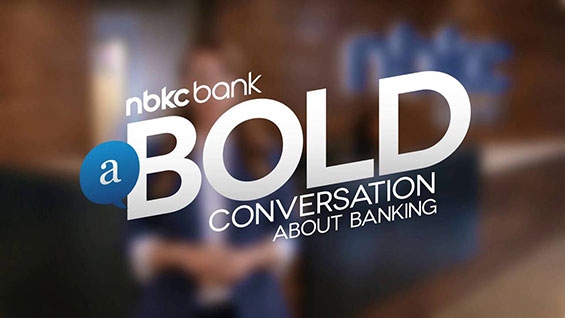
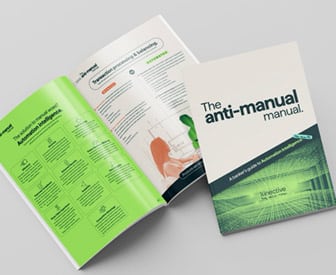
The New AI: A Banker’s Guide to Automation Intelligence
Manual tasks across channels is costly. And while AI is hot, there’s a simpler way to bring efficiency that many bankers have overlooked.
Read More about The New AI: A Banker’s Guide to Automation Intelligence

Improve Your Business Outcomes Through Data & Analytics
Gain centralized access to the credit bureaus and 20+ alternative data sources. Leverage advanced analytics to optimize marketing campaigns and loan decisions.
Read More about Improve Your Business Outcomes Through Data & Analytics
Giving Rocket a Run For its Money
 Online mortgage lending has been a very large part of NBKC Bank’s business model, and remains so. The bank was chartered in 1999 as National Bank of Kansas City, and was one of the banking industry’s earliest pioneers in the online home loan market. From the start, says Unruh, they concentrated on plain-vanilla first mortgages and VA mortgages.
Online mortgage lending has been a very large part of NBKC Bank’s business model, and remains so. The bank was chartered in 1999 as National Bank of Kansas City, and was one of the banking industry’s earliest pioneers in the online home loan market. From the start, says Unruh, they concentrated on plain-vanilla first mortgages and VA mortgages.
Now, people in all 50 states can apply online for a mortgage from NBKC. Its originations run between $2.5 and 3 billion annually, and the bank is one of eight mortgage lenders on Costco’s nationwide platform.
Quicken Loans, with its Rocket Mortgage brand, is the dominant player in mortgage originations. But Unruh maintains NBKC competes very well against the deep-pocketed national brand.
“If you go to Google and type in ‘NBKC reviews’ you’re going to see probably two full pages of five-star reviews,” he beams proudly. “We’re the most reviewed lender on Zillow — or one of them — and one of the highest.”
Indeed the bank boasts a 4.9 on a five-point scale at Zillow. Borrowers at LendingTree give the bank five stars, and 98% say they would recommend NBKC. Google Reviews gives them a 4.8 out of five stars. And Yelp! users score the bank with a respectable 4.5 out of five.
A key part of what sets the bank apart is that it is one of the few online mortgage lenders maintains a single point of contact for consumers throughout the process — from start to finish. Unruh believes this helps explain why the bank scores so well on independent lending sites like Zillow.
“We go about taking care of customers a little bit differently, so I think we compete very well on the overall experience,” Unruh says.
Going Nationwide: From Mortgages to Checking and Loans
NBKC Bank’s success in mortgage lending has allowed it to expand its digital presence. About two and a half years ago, the bank set about building a set of digital banking products from scratch to expand beyond online mortgage lending and its branch-based community banking. Not only were the products designed to be easily applied-for online or by mobile device, they were deliberately kept very simple, and few in number.
“Our philosophy is to do fewer things but do them very well — to try to be the best in the country at what we do,” Unruh explains. So far that has translated into a checking product for both consumers and small businesses, soon to be followed by a small business lending product.
Much like its online mortgage loans, NBKC’s online deposit accounts are highly rated on sites such as NerdWallet, Bankrate, and Facebook. Unruh explains how they achieve that.
“With most banks, people have to choose from a grid of checking account options, each with some kind of catchy name,” Unruh says. “We have just one checking account, but it has everything, including a very competitive interest rate [about 90 basis points at the time of the interview]. It also has no fees — no overdraft fee, no NSF fee, no per-item, no deposit fee.”
Customers only pay a fee when they need to make a domestic wire transfer: a pidly $5 compared to the national average of about $30.
The bank took the same approach with its online small business checking account — only one type of account with no fees and no minimum balances.


Accelerate Time-to-Market with Rapid Implementation
Create a sustainable competitive advantage with faster time to market by drastically reducing implementation time.
Read More about Accelerate Time-to-Market with Rapid Implementation

Success Story — Driving Efficiency and Increasing Member Value
Discover how State Employees Credit Union maximized process efficiency, increased loan volumes, and enhanced member value by moving its indirect lending operations in-house with Origence.
Read More about Success Story — Driving Efficiency and Increasing Member Value
Every Three Years, They’re All ‘Fired’
Things are moving fast in retail banking and NBKC Bank is adjusting all the time, but Unruh says about once every three years the executive team has a strategy meeting where the premise is that they’ve all been replaced by a new team. The idea, he says, is to come at the process with a fresh set of eyes.
Too often, says Unruh, bank management teams live in a vacuum, especially when they’ve been in a place for a long time.
“Management teams often fall into the trap of just trying to make things incrementally better,” he says. “Around here our approach is, ‘If it doesn’t work, can it? Don’t try to make a crappy thing better’.”
At the last strategy meeting, NBKC execs discussed changes in consumer behavior and considered the types of experiences people were getting from other industries.
“Many people talk about ‘The Amazon Experience’,” says Unruh. “But financial services has been very slow to adopt that kind of change. As a smaller player with more of a high-touch/high-tech approach, we thought we could emulate much of that.”
This soon led to the realization that such a bank can’t have products accompanied by four pages of small-print type.
“People are busy,” Unruh explains. “Nobody likes thinking about banking or going to a bank or having to go through a complicated process. We want banking to just work well and not have our customers have to worry about it.”
Read More: Making Banking Easy Isn’t Easy
Looking for The Right Human/Digital Balance
Keeping the human touch in a digital banking world is something Unruh and everyone at NBKC Bank thinks about frequently. As mentioned, the bank has kept humans involved in its online mortgage business. Doing the same with online deposit accounts, however, is a bigger challenge — one that Unruh concedes they are still figuring out. It has both logistical and financial aspects.
“We can make a decent amount of money on a home loan transaction,” note Unruh. “But if you’re talking about somebody who wants to ask a question about a checking account at eleven o’clock on a Saturday night, we couldn’t staff the same type of qualified professional for that situation [as with a mortgage loan].” The CEO says the bank is exploring use of a chatbot or virtual assistant as a partial solution.
“We don’t ever want to not have humans involved,” Unruh states firmly, “but we think there is supplemental technology available we can use to get the basics answered.”
Read More:
- Financial Institutions Failing To Humanize Digital Banking Experiences
- Why Digital Banking Should Include A Human Component
Launch a Fintech Accelerator? Why Not
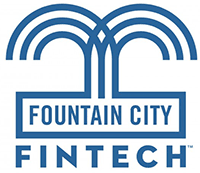 In many ways NBKC Bank operates and thinks more like a technology company than a bank. The company’s new headquarters, for example, is set up with casual dress every day, game rooms on all five floors, along with a stadium-style auditorium where they bring in nationally known speakers.
In many ways NBKC Bank operates and thinks more like a technology company than a bank. The company’s new headquarters, for example, is set up with casual dress every day, game rooms on all five floors, along with a stadium-style auditorium where they bring in nationally known speakers.
In addition, NBKC Bank just launched an accelerator program called Fountain City Fintech in conjunction with several Kansas City organizations. It claims to be the first community bank to do this. Accelerator programs more often are associated with big tech firms, or with big banks like Wells Fargo and Bank of America. The idea of these programs is to identify promising tech startup companies through a competition for funding and other benefits.
Early-stage fintech startups from six continents submitted applications to Fountain City Fintech. Over several months these were narrowed down to six. Each of these will receive an investment of at least $50,000 in exchange for an equity stake of 2% to 6%.
In addition to branding and visibility benefits, NBKC hopes to become the bank of record for the six companies, which will help by bringing in deposits, Unruh notes. Even more important, he adds, is that the bank will have the opportunity to work on projects with some or all of these fintech companies.

Make Your Own Breaks
At a gathering of community bankers where he spoke, Unruh described the outlook from his perspective for traditional banks to succeed in a rapidly evolving market for financial services.
Many community bankers, he says, know there are steps they should be taking but they are having trouble initiating some of those first steps.
“There is a lot of reliance by banks on their core processor or other outsiders to come up with the solutions,” says Unruh, “too much thinking that ‘Somebody needs to solve this problem for us and then give it to us at a monthly fee.’ I just don’t think it’s going to get solved like that. I believe bankers have to make some of these breaks happen themselves, which sometimes means getting out of your own way and seeing the world without a banker’s hat on.”
Unruh cautioned the audience against complacency.
“I guarantee everybody in this room will have customers leave their bank for a marketplace lender this year,” he said. Small-business people are working at night and on Saturdays. And when they’re thinking, ‘I need to get a new $100,000 line of credit,’ they probably won’t think about making an appointment at the bank at one o’clock in the afternoon.”
They’ll do it with a marketplace lender at night from their computer and they’ll be willing to pay a higher interest rate for it because of the speed and the convenience, said Unruh.
“If it’s taking you two weeks to make a decision on a $100,000 loan,” Unruh warned, “the world is passing you by.”

